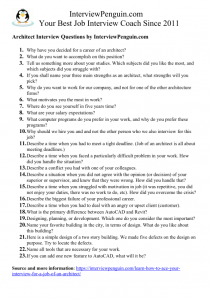Getting a job of an architect is not the most difficult task in the world. Experiencing economic expansion, new houses and halls, new streets and blocks are built everywhere. Companies need architects, and in a current state of affairs, the demand exceeds the supply. This may change with the recent virus pandemic, but it will likely be only a temporarily slowdown of the industry.
Therefor you won’t compete with dozen other job candidates in your interview for an architecture job. Sometimes you may actually be the only person who tries to get the position. Nevertheless, you still have to make a good impression while demonstrating your skills and right attitude to work. And you can do this with good interview answers. We can categorize the common questions for architect interview in three groups. Let’s analyze each group.
Personal questions
Most hiring managers will start the interview with some personal interview questions. The aim of these questions is to understand who you are, what you expect from your new employment, what are your strengths and weaknesses, and what value you can bring to your new employer while working as an architect.
Try to speak with enthusiasm about your role and career. Show them that you did your homework, and learned something about the company. Do not forget to ask them some questions, since interview is a dialogue (or at least it should be), and a person who is honestly interested in a place of work will always ask some questions about that place. Let’s have a look at the questions.
- Why have you decided for a career of an architect?
- What do you want to accomplish on this position?
- Tell us something more about your studies. Which subjects did you like the most, and which subjects did you struggle with?
- If you shall name your three main strengths as an architect, what strengths will you pick?
- Why do you want to work for our company, and not for one of the other architecture firms?
- What motivates you the most in work?
- Where do you see yourself in five years time?
- What are your salary expectations?
- What computer programs do you prefer in your work, and why do you prefer these programs?
- Why should we hire you and and not the other person who we also interview for this job?
Behavioral questions – the tough nut to crack
Your answers to personal questions (often also called screening questions) aren’t typically enough for them to decided about your application. At least not positively.
If they do not like you as a person, if you do not seem to fit the team they have in place, or if your goals and visions do not match their goals and visions, they may reject your application, right after you answered the personal questions.
But they still need to hear your answers to behavioral and technical questions to be able to evaluate your readiness for the job, and to make a final decision to hire you. To common behavioral interview questions belong:
- Describe a time when you had to meet a tight deadline. (Job of an architect is all about meeting deadlines.)
- Describe a time when you faced a particularly difficult problem in your work. How did you handle the situation?
- Tell us about a time when you worked on multiple projects (drawings, designs) simultaneously. How did you prioritize?
- Describe a conflict you had with one of your colleagues.
- Tell us about an obstacle you overcame.
- Describe a time when you struggled with motivation in job (it was repetitive, you did not enjoy your duties, there was no work to do, etc). How did you overcome the crisis?
- Tell us about a situation when you felt overwhelmed with work.
- Describe a time when you had to deal with an angry or upset client (customer).
- Tell us about a time when you showed initiative at work.
- …
The goal is to show the employer that you care, and that you are ready to face difficult situations that belong to the job of an architect.
If you are not sure how to answer the questions from my list, or experience interview anxiety, have a look at our Interview Success Package. Up to 10 premium answers to basically all scenario-based questions you may face in your architect job interview will help you streamline your interview preparation, find the right words in every moment of the interview, and eventually get this prestigious job. Thank you for checking it out
Technical questions for architecture interviews
It is not easy to earn a masters degree in Architecture, and most people who manage to achieve this feat are ready to do the job. Nevertheless, hiring managers may ask you a few questions that target your skill with certain computer programs, and your ability to do all kinds of works architects typically do.
In some cases they may even assign you a task prior to the interview, such as making a simple design, or suggest improvements to building plan which they already designed. But this is the case only when you apply for a job in a prestigious architecture firm, and compete with many other people for the job. Let’s have a look at some technical questions you may deal with in any other interview:
- What is the primary difference between AutoCAD and Revit?
- Designing, planning, or development. Which one do you consider the most important?
- Name your favorite building in the city, in terms of design. What do you like about this building?
- Here is a simple design of a two story building. We made five defects on the design on purpose. Try to locate the defects.
- Name all tools that are necessary for your work.
- If you can add one new feature to AutoCAD, what will it be?
Special Tip: You can also download the full list of questions in a one page long PDF, print it, and practice your interview answers anytime later:

Final thoughts and next steps
It is not easy to exactly estimate what will happen in your interview for an architecture job. Some companies need architects so desperately that they may hire you after few personal questions, and after they see your amazing portfolio. But in some other cases you may face a competition of ten other job applicants, and a plethora of tricky behavioral (scenario based) questions.
Just like a starting salary for an architect (which can vary from $35,000 to $85,000 in the US), the interviews for this position also vary from one company to another. Once you prepare for all possible questions, however, you can be sure that the hiring managers won’t catch you off guard…
One last advice I want to give you: Ask a lot of questions, and do not automatically accept the first offer you will get. There are a lot of egocentric people working in architecture. Try to learn something about your future colleagues, and also about the projects you will work on, before you accept their offer…
May also interest you:
- Salary negotiation tips – A starting salary for architects varies widely across the country. Learn how to negotiate a better starting salary in your interview.
- Interview Success Package – Premium answers to all personal and behavioral interview questions.
- How to overcome interview nerves – Nerves can kill your chances in every interview. Overcome them and impress the hiring managers.


